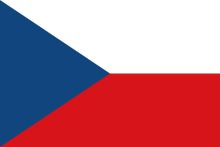Czechs

 | |
| Total population | |
|---|---|
| c. 10–12 million | |
| Regions with significant populations | |
6,732,104[1][nb 1]–9 246 784[2] | |
| Significant diasporic populations in: | |
| 1,462,000[3] | |
| 94,805[4] | |
| 60,000 | |
| 50,000 | |
| 45,000 | |
| 45,000[5] | |
| 40,324[6] | |
| 40,000 | |
| 38,000 | |
| 30,367[7] | |
| 21,196[8] | |
| 20,000 | |
| 9,641 (2011) | |
| 8,600 | |
| 11,000 | |
| 7,175 (2001) | |
| 5,451[9] | |
| 5,622 (2006) | |
| 5,000–6,000 | |
| 3,500 | |
| 3,339 (2002) | |
| 3,000 | |
| 2,300 | |
| 2,000 | |
| 2,000 | |
| 1,824 (2011)[10] | |
| 1,200 | |
| 1,083 | |
| 1,000[11] | |
| 600–1,000[12] | |
| Languages | |
| Czech | |
| Religion | |
| Mostly irreligious[13] Historically Christian Roman Catholic, Hussite, Lutheran and other | |
Czechs (Czech: Češi, Czech pronunciation: [ˈtʃɛʃɪ], archaic Czech: Čechové [ˈtʃɛxɔvɛː]) are a western Slavic people of Central Europe. Most live in the Czech Republic. Small amounts of Czechs also live in Slovakia, Austria, U.S., Brazil, Argentina, Canada, Germany, Russia and other countries. They speak the Czech language, which is closely related to the Slovak and Upper Sorbian language.[14]
References
[change | change source]- ↑ "Tab. 6.2 Obyvatelstvo podle národnosti podle krajů: výsledky podle trvalého bydliště" [Tab. 6.2 Population by nationality by regions: results for permanent residence] (PDF). Czech Statistical Office (CZSO) (in Czech). 2011. Archived from the original (PDF) on 16 January 2013.
- ↑ "Czech Republic". CIA - The World Factbook. Archived from the original on 26 December 2018. Retrieved 14 November 2014.
- ↑ "2004 survey". United States Bureau of Statistics. Archived from the original on 11 February 2020. Retrieved 14 November 2014.
- ↑ "Ethnic Origin (264), Single and Multiple Ethnic Origin Responses (3), Generation Status (4), Age Groups (10) and Sex (3) for the Population in Private Households of Canada, Provinces, Territories, Census Metropolitan Areas and Census Agglomerations, 2011 National Household Survey". 12stat.can.gc.ca. Retrieved 20 December 2017.
- ↑ "Table 1.3: Overseas-born population in the United Kingdom, excluding some residents in communal establishments, by sex, by country of birth, January 2013 to December 2013". Office for National Statistics. 2 July 2015. Retrieved 20 July 2015. Figure given is the central estimate. See the source for 95 per cent confidence intervals.
- ↑ "Bevölkerung nach Staatsangehörigkeit und Geburtsland". Statistik.at. Retrieved 20 December 2017.
- ↑ "Error page". 29 March 2014. Archived from the original on 29 March 2014. Retrieved 20 December 2017.
- ↑ "Data & analysis". Censusdata.abs.gov.au. Archived from the original on 9 July 2008. Retrieved 18 March 2015.
- ↑ "CSO Emigration" (PDF). Census Office Ireland. Retrieved January 29, 2013.
- ↑ "Попис становништва, домаћинстава и станова 2011. у Републици Србији: Становништво према националној припадности - "Остали" етничке заједнице са мање од 2000 припадника и двојако изјашњени" (PDF). Webrzs.stat.gov.rs. Archived from the original (PDF) on 17 April 2016. Retrieved 20 December 2017.
- ↑ Joshua Project. "People Groups". Joshuaproject.net. Retrieved 14 November 2014.
- ↑ "Bosna-Hercegovina - Bosna-Česko". 14 October 2007. Archived from the original on 14 October 2007. Retrieved 20 December 2017.
- ↑ "Náboženská víra obyvatel podle výsledků sčítání lidu - 2011". Czso.cz (in Czech). Czech Statistical Office. Retrieved 30 September 2017.
- ↑ Czech language, alphabet and pronunciation
Notes
- ↑ This number is a lower estimate, as 2,742,669 people opted out declaring ethnicity in 2011.